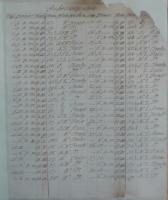Dorothy Wordsworth & John Clare
'We then went to John's Grove, sate a while at first. Afterwards William lay, & I lay, in the trench under the fence - he with his eyes shut & listening to the waterfalls & the Birds. There was no one waterfall above another - it was a sound of waters in the air - the voice of the air. William heard me breathing & rustling now & then but we both lay still, & unseen by one another - he thought that it would be as sweet thus to lie so in the grave, to hear the peaceful sounds of the earth & just to know that ones dear friends were near'. - Dorothy Wordsworth, Grasmere Journal, April 29, 1802
"Frances Wilson writes that, ‘more than any other aspect of her character, it was Dorothy’s responsiveness that was valued and praised by all who knew her’. As a little girl she apparently burst into tears when she first saw the sea, revealing, according to Wilson, ‘the sensibility for which she was celebrated by her family’. . . . As an old woman, Wilson recounts, Dorothy wept at the sight of her garden flowers after an illness had kept her indoors: ‘In the readiness and accuracy of her responses, her taste was, Coleridge said, ‘a perfect electrometer—it bends, it protrudes, and draws in, at subtlest beauties and most recondite faults’. An electrometer was a recent invention, consisting of a ‘fragile piece of gold, enclosed in glass, which responded to the most minute fluctuations of electrical charge’, and Wilson suggests that in using it, Coleridge’s metaphor bestowed on Dorothy ‘his highest possible praise’". - Patricia Pender, on Frances Wilson's The Ballad of Dorothy Wordsworth (2008)
'as you have not [been acquainted with some of the serious clergy] I am pleased that you have even joined any body of religious people who are really in earnest – your good sense will preserve you I trust from their extravagances … I would rather see you too warm than too cold, and lukewarmness is worse than all … The chief danger among persons of the class you have joined is that from encouraging too much appeals to the feelings they suffer their passions to be wrought up very highly, and when the passion cools, as cool it must, they find it necessary for the appearance of consistency, to keep up a very high profession with very little feeling – & this either is or becomes hypocrisy … Prayer is the great preservation against presumption on the one hand and lukewarmness on the other, and I hope you will be enabled to persevere in the constant and fervent use of it' - James Hessey, letter to Clare, 1824 (Hessey was one of Clare's publishers)
'I have been several mornings to bid them farewell - had I £100 to spare I would buy their reprieves - but they must dye - yet this mourning over trees is all foolishness they feel no pains they are but wood cut up or not - a second thought tells me I am a fool was People all to feel & think as I do the world coud not be carried on - a green woud not be ploughd a tree or bush woud not be cut for firing or furniture & every thing they found when boys would remain in that state till they dyd - this is my indisposition & you will laugh at it' - Clare, letter to John Taylor, 1821
'Superstition lives longer than books; it is engrafted on the human mind till it becomes a part of its existence; and is carried from generation to generation on the stream of eternity, with the proudest of fames, untroubled with the insect encroachments of oblivion which books are infested with. There are also many desires to gain this common fame, and it is mostly met with in a manner where it is the least expected. While some affectations are striving for a life-time to hit all tastes, by only writing as they fancy all feel, and by not trusting to their own feelings, miss the mark by a wide throw, an unconscious poet of little name writes a trifle as he feels, without thinking of others, or fancying that he feels it, and becomes a common name. Unaffected simplicity is the every-day picture of nature―thus children’s favourites, “Cock Robin,” “Little Red Riding Hood,” “Babes in the Wood,” &c. &c. leave impressions at the core that grow up with manhood and are beloved on. Poets anxious after common fame, as some of the “naturals” seem to be, imitate these things by affecting simplicity, and become unnatural.' - Clare, 'Popularity in Authorship', (1824), The European Magazine, November 1825 (New Series, Vol. I, No 3, pp. 300-303)

